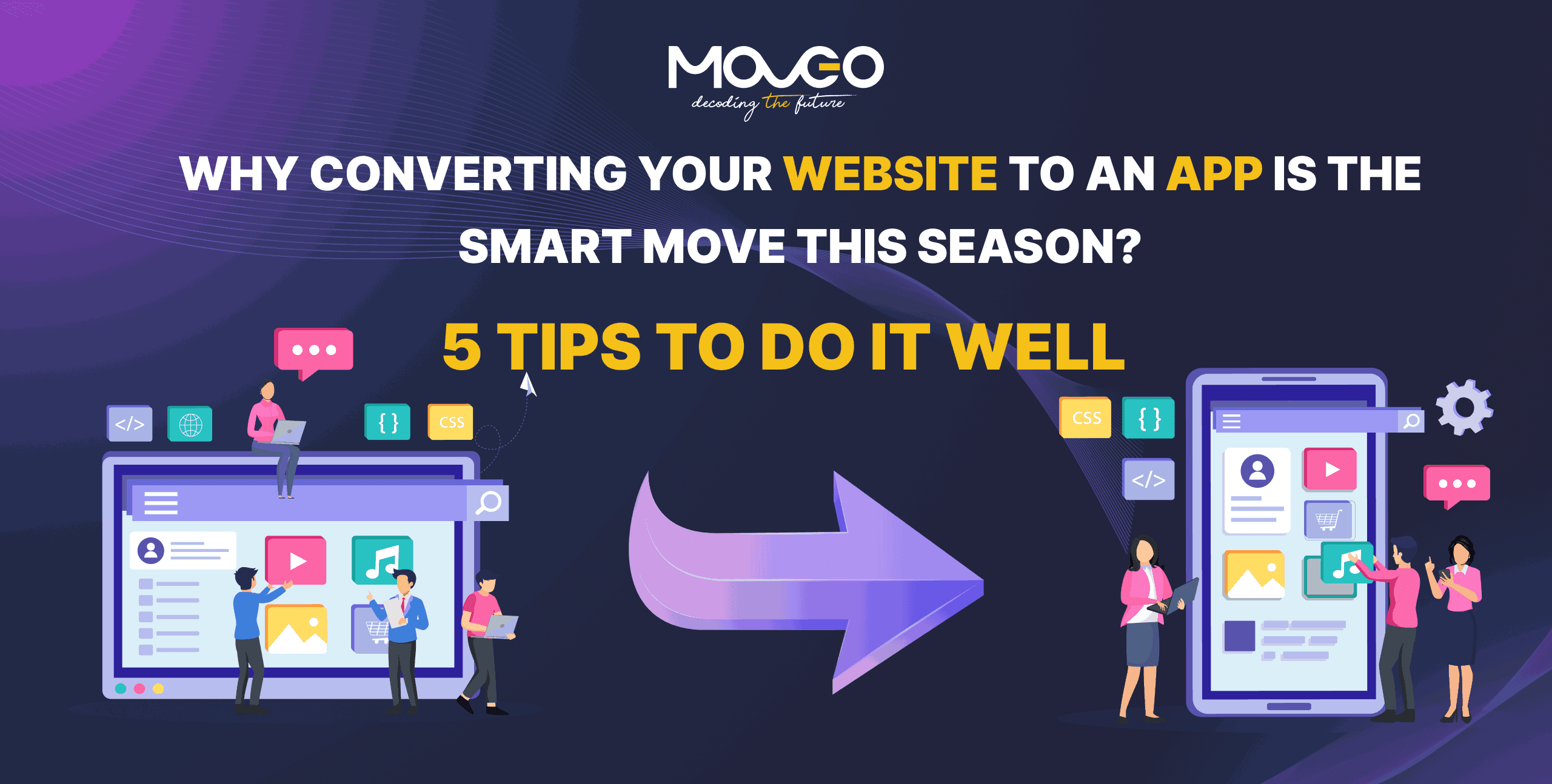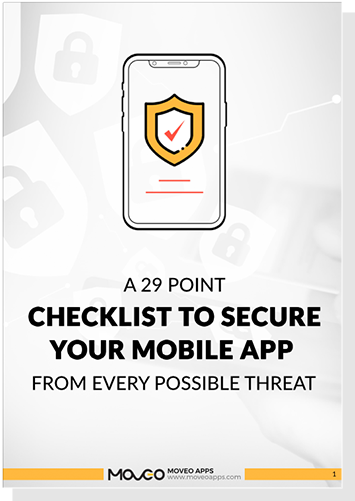Have you ever wondered if converting your website into an app would improve your revenue, engagement, and customer service? The answer is Yes. Mobile apps have many significant advantages over websites when it comes to reaching more customers, and providing a great user experience. With the right dedicated app development team, you could actually convert your website into a mobile app within a few short weeks.
But why? Isn’t a website enough?
Sure you can easily display and sell products with a website, or relay information and catch referral traffic. But with efficient app development, you can do all of these things in a much deeper, more immersive manner. Mobile apps let you build meaningful connections with your audience, engage visitors with authentic branding, and create a delightful shopping experience. In essence the difference between a website and an app is that of a shop and a flagship boutique.
Apps Outshine Websites in Key Areas Such As:
- Immersive experiences tailored to preferences
- Personalized content and features
- Offline Accessibility
- Leveraging native mobile features
- Timely relevant push notifications
As user preferences evolve, businesses can leverage the unique capabilities of mobile apps to not just meet but exceed the expectations of their audience, ensuring sustained growth and relevance in an increasingly competitive market.
Users Prefer Apps Over Websites
A sweeping majority of consumers say that they prefer the experience of using an app as compared to a website. And they don’t just say it, they do as they say. In 2023, users spent over 5 hours a day using apps, which means they essentially spent one-third of their waking hours using some mobile app or the other.
This shift towards app usage underscores the growing preference for the immersive and convenient experiences offered by mobile apps, highlighting the opportunities that mobile apps offer businesses in providing value in ways that websites alone cannot match. As consumer behavior continues to prioritize convenience, personalization, and seamless experiences, businesses must adapt by prioritizing the development of mobile apps to meet these evolving expectations and stay ahead in an increasingly competitive digital landscape.
Source: Data.ai
Why You Should Convert Your Website to an App
Now that you know how much users prefer using apps offer websites, let’s delve deeper into the unique advantages of converting your website into an app.
Enhancing the User Experience
On a website, a large fraction of the limited screen space is taken over by the browser tabs and other elements that infringe upon your design and content. These elements are also annoyingly distracting, that not only diminish the user experience but also often lead the user away from your content.
Mobile apps on the other hand eliminate all distractions and provide an immersive experience, making for a vastly superior user experience. They are designed with mobile users in mind, offering interfaces and interactions optimized for small screens and touch controls. This results in improved UI design, faster performance, better navigation, and higher engagement levels.
Speed and Performance
One of the key advantages of mobile apps is their ability to store data locally on the user’s device, resulting in significantly faster load times and smoother transitions between features and content. By minimizing reliance on internet connectivity, apps allow users to access information and navigate within the app with minimal delays. This helps retain users, as research shows that even minor loading delays can lead to frustration and ultimately abandonment of the app.
Better Navigation and Accessibility
With features like bottom navigation bars or swipeable tabs, users can effortlessly navigate through different sections of the app, ensuring a seamless and user-friendly experience. These intuitive navigation options make it easier for users to find what they’re looking for, encouraging deeper exploration of the app’s features and content. Unlike websites, which may require users to navigate through multiple pages or menus to access desired information, apps streamline the navigation process, enhancing overall accessibility and usability.
Engagement, Re-engagement, and Satisfaction
Mobile apps excel in fostering user engagement and satisfaction through features like push notifications and personalized content.
Push notifications provide timely updates and help re-engage users when they’re not actively using the app. By enticing users with compelling offers on an item in their wishlist, or drawing their attention to an item they left in the cart, apps help capture user interest at the perfect time in a manner that’s hard to ignore.
Accessing Native Mobile Features
One of the most compelling reasons to convert a website into an app is the ability to access native mobile features. These features, intrinsic to mobile devices, enable enhanced user interaction, engagement, and functionality.
For instance, leveraging the device’s GPS functionality enables location-based services, such as providing users with tailored content based on their current location or offering directions to nearby points of interest. Integrating the camera allows for interactive features like scanning QR codes or uploading images directly from the device, enhancing user engagement and functionality.
Other device features like accelerometer, contact list, and biometric authentication, empower app developers to create immersive and dynamic experiences that elevate user interaction and satisfaction beyond the capabilities of a website.
Boost Brand Recognition Amongst App Users
Converting your website into an app enhances brand visibility and recognition, notably through the presence of your app icon on a user’s home screen. This constant visual reminder reinforces brand awareness and engagement.
With an app icon just a tap away, apps reduce the barrier to interaction and increase the likelihood of engagement. Well-designed app icons convey your brand’s essence, contributing to a recognizable brand identity. When users open an app, all the little elements like microanimations, personalized greeting, picking up where they left, and acknowledging their past activity helps build continuity and familiarity, making you a part of the users life in a meaningful and connected sense.
Improving Customer Retention
Mobile apps offer powerful tools for enhancing customer retention through direct engagement, personalized experiences, and loyalty incentives. Well timed push notifications grab user attention, personalized offers bring them back from throes of inactivity, and loyalty programs foster ongoing dialogue with users and increase brand loyalty.
Optimizing Performance and Speed
Well-optimized apps offer quick loading times and smooth interactions, setting themselves apart in a competitive digital environment. Faster apps lead to higher user engagement and conversion rates, enhancing overall usability and satisfaction.
5 Tips to Encourage Users to Download your App and Transition Effectively
Here comes the important step – how to successfully get your website users to download your app and use it regularly. Most websites try to promote their app using a discount code or a free gift, which is a perfectly good practice.
However, app fatigue is a real issue and most users feel reluctant about downloading yet another app on their mobile phones, especially given the limited storage space they have. Transcending this barrier is a key step in encouraging app downloads and promoting engagement.
Don’t you worry though, as we have years of experience working with both app users and stakeholders. Thousands of hours of user research have taught us that you have to show them quantifiable value in order to get them to cross the threshold.
So here are our 5 battle-tested techniques to motivate your website users to download your app, and actively use it.
Tip 1: Offer a truly useful coupon
It’s a classic so we’ll begin with this – offer a coupon that is appealing enough for your users. Psychology speaking, consumers have a mental threshold for discounts. They may be more motivated to buy when they see a “20% off” deal than a “5% off” which feels like a marginal benefit.
Tip 2: Win the download barrier by telling them in specifics how lightweight you are
Most users are reluctant to download apps fearing the lack of storage space. Yet few realize that photos take up the biggest chunk of storage on a phone. The average Android app is 23 MB, and the average iOS app is just 6MB. Some photos taken by advanced camera phones are as large as 10 MB but no one thinks of that before clicking.
If your app weighs about 50 MB, tell your website visitors that your app takes up less storage than those five blurry photos you’ve been meaning to delete from your phone. Delete them and you could unlock exclusive app benefits in just seconds.
If the app weighs more, use a comparable analogy, you get the drift!
Tip 3: Code for top notch onboarding
77% of users abandon an app within 3 to 7 days of download. However, an app redesign study by Localytics shows that user retention increased by 50% after introducing proper user onboarding!
Quite simply, you need a suave onboarding flow that gets your website users onto the exact page and product they were checking out withing seconds of downloading the app. Use auto-detecting OTP, social media login, smart autofill, and a range of other techniques to get the user from website to app, without any delays or hang-ups, if you wish to keep them on your app.
Tip 4: Keep permissions to bare minimum
Ask only for what you absolutely need. For a user to log in, ask only for an email or a phone number, not both. If you need access to camera, contact list, or other device features, wait until the user is comfortable with your app. Do not ask for unnecessary permissions, and do not ask for a rating prematurely. Keep it strictly about the user’s convenience and not your KPI’s for now.
Tip 5: Protect their privacy and security, and assure users of it
Few things trigger more caution than digital privacy and security today. Ensure complete protection of the users’ data with effective cybersecurity protocols while developing your app. When asking website users to download your app, assure them that you will treat their data with the utmost respect and discretion.
Conclusion
In conclusion, converting your website into an app offers a multitude of benefits that are essential for staying competitive in today’s digital landscape. From enhancing user engagement and loyalty to driving revenue growth and streamlining operations, the strategic value of embracing mobile app technology is undeniable. With the right app development team, you can convert your app into a website within a short period of time, and unlock new potential, increasing sales, revenue, and competitiveness.



